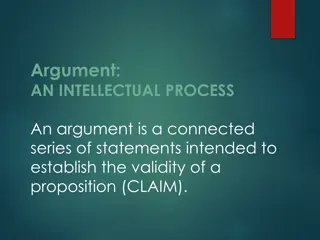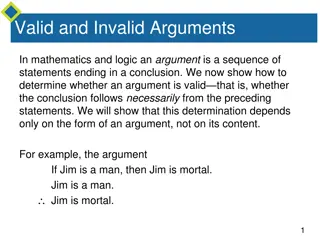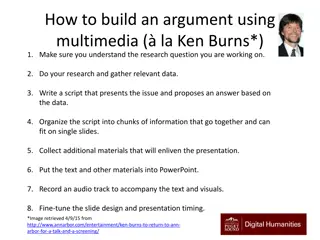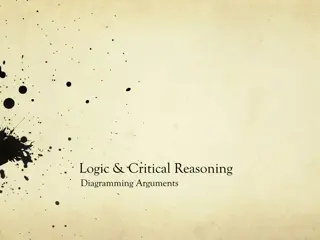Understanding the Basic Components of an Argument
This chapter delves into the fundamental aspects of constructing and analyzing arguments. It explores the elements of an argument, such as the issue, claim, support, and refutation. Through readings on organ donation and tipping, it guides readers on actively engaging with and critically evaluating various viewpoints to enhance their argumentative skills.
Download Presentation

Please find below an Image/Link to download the presentation.
The content on the website is provided AS IS for your information and personal use only. It may not be sold, licensed, or shared on other websites without obtaining consent from the author. Download presentation by click this link. If you encounter any issues during the download, it is possible that the publisher has removed the file from their server.
E N D
Presentation Transcript
CHAPTER 20 20 CHAPTER Reading Arguments Reading Arguments
Contents of Chapter 20 Contents of Chapter 20 The Basic Parts of an Argument Reading: Organ Donation: A Life-Saving Gift, by Quinne Sember Reading: Tipping Is an Abomination, by Brian Palmer Reading Actively and Thinking Critically Before You Read While You Read Analyzing the Basic Components of an Argument Identifying Emotional Appeals Evaluating Opposing Viewpoints Detecting Faulty Reasoning (continued)
Contents for Chapter Contents for Chapter 20 20 Readings: Argument in Action Reading: How (and Why) to Stop Multitasking, by Peter Bregman Reading: In Defense of Multitasking, by David Silverman
What Is an Argument? What Is an Argument? A sound argument makes a claim and offers reasons and evidence in support of that claim, while anticipating, acknowledging, and responding to opposing viewpoints.
The Basic Parts of an The Basic Parts of an Argument Argument The Issue A controversy, problem, or idea about which people hold different points of view. The Claim 1. 2. 3. Claims of fact Claims of value Claims of policy (continued)
The Basic Parts of an The Basic Parts of an Argument Argument The Support Reasons (general statement that supports a claim) Evidence (Facts, statistics, examples, expert opinion, personal experience) Emotional Appeal Appealing to needs Appealing to values Refutation A rebuttal that acknowledges an opposing view and argues against it.
Readings Organ Donation: A Life-Saving Gift, by Quinne Sember Tipping Is an Abomination, by Brian Palmer
Reading Actively and Reading Actively and Thinking Critically Thinking Critically Before You Read 1. Think about the title. 2. Check the author s name and credentials. 3. Look for the original source of publication, its slant, and its intended audience. 4. Check the publication date. 5. Preview the essay. 6. Think about the issue before you read. (continued)
While You Read 1. Read first for an initial impression. 2. Read a second time with a pen in hand. 3. Check your comprehension by summarizing or drawing a graphic organizer (continued)
Analyzing the Basic Components of an Argument The writer s purpose The intended audience The writer s credibility Support: reasons and evidence Definitions of key terms (continued)
Identifying Emotional Appeals (continued)
Evaluating Opposing Viewpoints Does the author state the opposing viewpoint clearly? Does the author present the opposing viewpoint fairly and completely? Does the author clearly show why he or she considers the opposing viewpoint wrong or inappropriate? Does the author acknowledge or accommodate points that cannot be refuted? (continued)























